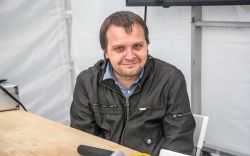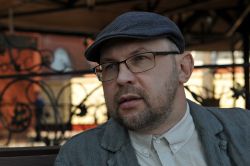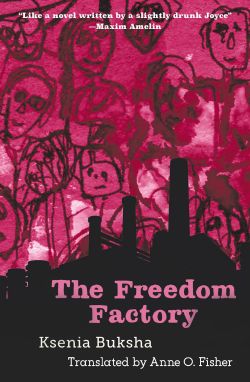Born: 1978
Quick Study: Alexei Salnikov quickly became a beloved name among Russian readers thanks to darkly humorous fiction that takes place along the borders of relentlessly realistic, ordinary, everyday Urals lives and eerie, unknowable layers of that same reality.
The Salnikov File: Salnikov, who writes poetry and prose, published his first poetry collections with regional Urals presses in the early 2000s. His most recent collection, Cat, Horse, Tram, Bear, was published by Livebook (Moscow) in 2019. Livebook also published his first novel, The Department, in 2017: The Department details the mysterious work of an odd lot of government employees at a strange department. They are tasked with interrogating and killing citizens but have no idea why. The Department is Salnikov’s second novel published in full, following The Petrovs in and Around the Flu, which won the National Bestseller Award in 2018, received the NOSE Award’s critics’ prize in 2019, фтв hit the Big Book Award shortlist. The Petrovs drew in readers with another Urals setting plus hallucinatory flu symptoms and a seemingly ordinary family that might have a very dangerous side. Indirectly, a 2019 Big Book finalist that’s also set in the Urals, depicts a society where poetry is banned as if it were a narcotic.
Psssst….........: The Petrovs has been adapted for stage and a screen version is on the way, in 2021, from director Kirill Serebrennikov...
Salnikov’s Places: Born in Tartu, Estonia… The Urals: Salnikov lives in Yekaterinburg and has lived in Nizhny Tagil…
The Word on Salnikov: In a review on Colta.ru, critic Nikolai Alexandrov writes of The Petrovs: “So what is this novel really about? It’s about the strange twisted reality that, as critics wrote a couple centuries ago, stifles and oppresses, that doesn’t let anything go or escape. It’s about the ‘creatures around us,’ as Petrov says, this world’s original inhabitants, who don’t much resemble people… Well, it’s also about the beast hiding within a person.”
Salnikov on Salnikov & Writing: In an interview with Elena Safronova for the site Revizor, Salnikov gives this answer when asked about advice for potential young and aspiring authors, “Oh, if there were knowhow like that, I’d have used it! But there isn’t. You have to sit down and write what comes into your head. Best of all, of course, according to a plan: that way at least you can see progress. Without that, the brain refuses to work.
Salnikov Recommends: When asked in an interview with Meduza who his favorite literary character is, Salnikov answers Ostap Bender, from Ilf and Petrov’s The Twelve Chairs. He then adds “not long ago I also took a liking to Dostoevsky in his own letters. He’s already a literary hero in them and he’s still literarily polishing up his life in those letters. He’s all tired, tormented, firmly knowing everything will end badly.”
Born: 1963
Quick Study: Maxim Osipov, a medical doctor, first made a name for himself as a literary writer thanks to short stories and sketches about life in the Russian provinces.
The Osipov File: Maxim Osipov broke into creative writing after a patient and close friend died and he brought about fifty pages of diary entries to the patient’s widow, asking her not to show them to anyone. She didn’t heed his request, even showing his writing to publishers, which has led, over the years, to Osipov publishing a broad array of stories, essays, and plays. He first published short works in the literary journal Znamya in 2007, winning an award from Znamya that same year. His first book-length collection, Can’t Complain (more literally: A Sin to Complain), came out in 2009 and was shortlisted for the NOSE and Yasnaya Polyana awards. Osipov has gone on to publish five more compilations and his work has been translated into about a dozen languages, including English: Rock, Paper, Scissors, translated by Boris Dralyuk, Alex Fleming, and Anne Marie Jackson, and published by New York Review Books, was published in 2019. His play Russian and Literature, which is based on Rock, Paper, Scissors, has been staged in Omsk and St. Petersburg.
Psssst………: Osipov’s earliest book-length writing was co-written with Nelson Schiller: Клиническая эхокардиография (Clinical Echocardiology), published in 1993; a second edition came out in 2005. Osipov’s personal Web site calls it “the best-known Russian-language manual for that specialty”… Osipov founded his own publishing house, Practica, in 1993, where he says he edited many books; Practica primarily published translated medical books…
Osipov’s Places: Born in Moscow… has lived and worked in San Francisco… lives in Tarusa…
The Word on Osipov: In a 2014 interview with Izvestia (English translation), theater specialist, critic, and translator John Freedman called Osipov “a rising star.” Freedman included his own translation of Osipov’s second play, Козлы отпущения (Scapegoats), inspired by Dostoevsky’s Crime and Punishment, in an anthology he edited, Real and Phantom Pains: An Anthology of New Russian Drama (preview).
In her review for The New Republic, Jennifer Wilson writes, “But Rock, Paper, Scissors gestures deeper than simply documenting the struggles people face in finding convenient and reliable healthcare. It explores the narrative function of medicine and the storytelling potential that exists in the doctor-patient relationship. In Osipov’s stories, doctors are frequently vessels by which the stories of their patients are told, after the patient has passed away or after their mental faculties make it difficult for them to recall who they once were.” (Wilson says that her favorite story in the collection is “After Eternity: The Notes of a Literary Directory.”)
Osipov on Osipov & Writing: When Daniel Medin asked Osipov, in an interview with the Los Angeles Review of Books, if he could “imagine ever writing a novel,” Osipov answered with simply, “No, I cannot. But this does not mean I will not come up with one someday.”
Osipov Recommends: In that same LARB interview with Medin, Osipov mentioned admiring Platonov, “especially his stories,” and added that Nikolai Zabolotsky “probably affected my style — both his early poems as well as the ones written well after most of the group had died or been killed. I consider him one of the greatest poets of the last century.”
Photo credit: Divot, via Wikipedia, Creative Commons
Born: 1969
Quick Study: Aleksei Ivanov is well-known for writing absorbing novels – some set centuries ago, others taking place in our time, some utterly realistic, others featuring elements of fantasy – and his fame has broadened through screenplays and a starring role in the 2010 TV miniseries The Ridge of Russia, which combines adventure and Russian history.
The Ivanov File: Aleksei Ivanov’s earliest writings went unpublished for years but his first two published books, which came out in 2003, became two of his best-known works: The Geographer Drank His Globe Away, a novel about a modern-day teacher written in 1995, and Heart of Parma, a historical work about Perm written in 2000. Coming into print relatively late has clearly paid off for Ivanov: he followed those two books with two others that had been sitting in desk drawers plus Riot Gold, a historical action novel that won the 2006 Yasnaya Polyana Award for contemporary fiction and a Big Book Award readers’ choice prize. His Nasty Weather, a suspenseful social novel about Afghan War veterans, was shortlisted for the 2016 Big Book Award and adapted into a miniseries. He has written around two dozen books of fiction and nonfiction. Ivanov’s Быть Ивановым (Being Ivanov), released in autumn 2020, collects readers’ questions to Ivanov and his answers, a dialogue that the book’s site says began in 2005, when Ivanov made his Web site. More than four thousand questions have appeared.
Psssst………: The film Tsar, written by Ivanov, directed by Pavel Lungin, and starring Petr Mamonov (as Ivan the Terrible!) and Oleg Yankovsky, competed in the 2009 Un Certain Regard section at the Cannes Film Festival… Ivanov didn’t allow his books to be nominated for awards for some years after Heart of Parma (2005) was taken out of Russian Booker Prize contention for “lacking signs of a novel”… But Ivanov agreed to having his Nasty Weather nominated for the Big Book and Prose of the Year awards in 2016 and received results: the novel won Prose of the Year and was shortlisted for the Big Book… Ivanov received his first honorarium (three rubles, fifty kopecks) as a writer when he was a schoolboy, in 1986, when he wrote a piece that rebutted an article in Soviet Russia about the shortest letter in the world. He argued that Victor Hugo’s letter to his publisher reading only “!” after the release of The Hunchback of Notre-Dame is longer than the blank sheet of paper a general sends to Kutuzov in Tolstoy’s War and Peace… Several years later, when Ivanov participated in a Latvian writers’ workshop, Sergei Lukyanenko was named the main discovery and Ivanov the main flop; Victor Pelevin also participated and apparently avoided those extremes… The Ridge of Russia is a four-episode TV miniseries for which Ivanov, journalist Leonid Parfenov, and producer Yuliya Zaitseva traveled the Urals, covering thousands of kilometers, over 100 cities and towns, and more than four centuries…
Ivanov’s Places: Born in Gorky (now Nizhny Novgorod) but grew up in Perm, has said he lives where he works… studied art history on his second go at university studies (he’d tried earlier, as a journalism major, thinking that was the best course for a writer but realized it wasn’t so took some gap time) at Urals State University…
The Word on Ivanov: The first paragraph of Nadezhda Kazakova’s review of Nasty Weather for “Book Friends Club” ends by saying that in this novel about Afghan War veterans, “ideas that continue the humanistic ideas of great Russian classics including Dostoevsky stand behind a fairly simple plot.” When Ivanov’s Heart of Parma was released, critic Konstantin Milchin called it one of the year’s best, saying “If I tell you what the book is about, you’ll never believe it could be interesting.” After going on to mention that it’s about Russia’s conquest of the Perm region in the late fifteenth century, contains lots of Finno-Ugric words, and includes both real figures as well as immortals and werewolves, not to mention battle scenes more impeccable than those in The Lord of the Rings, Milchin says what’s most annoying is that the book didn’t even make the Russian Booker Prize’s longlist.
Ivanov on Ivanov & Writing: Ivanov has said on his site (answering a question from “Vladimir” on May 24, 2020) that he plans to write a book about the Russian Civil War. In answering another question (from “Dmitry,” June 2, 2020), Ivanov says that he doesn’t currently plan to write additional novels about contemporary Russia, citing aggression and discord he wishes to avoid. (link to this page)
Ivanov Recommends: When asked by a reader (Sergei) on his site (June 12, 2020), for nonfiction recommendations of interesting books that are classics in their genres, Ivanov suggested Peter Ackroyd’s London and Daniel Yergin’s The Prize. When an interviewer for Afisha asked if there were any books he wished he’d written, Ivanov mentioned Gabriel García Márquez’s One Hundred Years of Solitude and Winston Groom’s Forest Gump. When questioned about the best vampire book, he named Stephen King’s ‘Salem’s Lot.
Photo credit: Yuliya Zaytseva Creative Commons
Born: 1983
Quick Study: Ksenia Buksha is a St. Petersburg-based poet and writer whose fiction combines humor, elements of speculative fiction, and, frequently, her city’s atmosphere. She’s also an artist whose work often appears in the pages and on the covers of her own books.
The Buksha File: Although Ksenia Buksha began publishing her writing in the early noughties, she began gaining broader notice in 2014, when her The Freedom Factory (translated into English by Anne O. Fisher) won the National Bestseller Award and hit the Big Book Award shortlist. This polyphonic novel, based on factual material, tells of a Soviet military factory in post-Soviet times. Her futuristic The Detector focuses on a group of people held on a remote island and her Churov and Churbanov, a very Petersburg novel that was also a Big Book finalist, describes two classmates with similar names and intersecting fates while considering what might happen if hearts could be synchronized. Buksha’s diverse portfolio of publications includes poetry and story collections, and other novels, as well as a biography of artist Kazimir Malevich; she has also worked as a journalist.
Psssst………: Buksha began writing as a teenager, finishing her first book when she was eighteen… Buksha has written under the pseudonym Kshishtof Bakush, whom she sees as “a virtual grampa who’s seventy-four” and whose surname rearranges her own. She says she invented him – an eccentric old millionaire – because he can say whatever he wants thanks to his age and wealth and “nobody can say I’m showing off and talking about things ‘I haven’t the slightest idea’ about. It’s not really me, it’s grandpa Bakush”… Buksha said she learned German so she could read and understand the words of Bach’s cantatas and Gunther Grass…
Buksha’s Places: Born in Leningrad, studied at St. Petersburg State University, majoring in economics…
The Word on Buksha: Writer and critic Dmitry Bykov once called Buksha “a normal twenty-five-year-old genius” and said of her writing that “if Khlebnikov understood anything about economics and Kharms had looked optimistically into the future, this is about how they would have written.” Critic Galina Yuzefovich concluded her review of Buksha’s connected stories, Opens In, by writing, “In short, if there’s someone today who can vie for the title of a Russian Alice Munro, that’s unquestionably [Buksha] and that’s excellent news for [Russian] literature.”
Buksha on Buksha: In a 2010 piece for Sobaka.ru, Buksha said she doesn’t see herself as being part of any sort of literary trend, though she doesn’t have any other sort of separate position either. “Basically, no single literary space exists now. More specifically, there’s global intellect but that’s a space for all human thought, not just literature. As far as I go, I enjoy writing books and poetry and want very much for them to be read all over but without people being curious about me.”
On Writing: Buksha said in an interview with Russian Esquire that Oberiu (on Wikipedia, in brief, here) is where it’s at for writing poetry. This isn’t surprising, considering that in the same piece she says, “I don’t like the Russian poetry tradition very much.”
Buksha Recommends: In an interview with Russian Esquire, Buksha names favorite poets including Grigory Danishevsky, Viktor Ivanov, and particularly Galina Rymbu. She also lists three authors she considers “close”: Konstantin Vaginov, Alexander Vvedensky, and Lidia Ginzburg. She says she adores Marina Tsvetaeva and Boris Pasternak.
When asked if she prefered Tolstoy or Dostoevsky, she opted in favor of Dostoevsky, adding that she lives near Sennaya Square so “everybody I run into is a Dostoevsky figure. Absolutely everyone.”
Page 3 of 21 pages < 1 2 3 4 5 > Last ›


__250.jpg)

